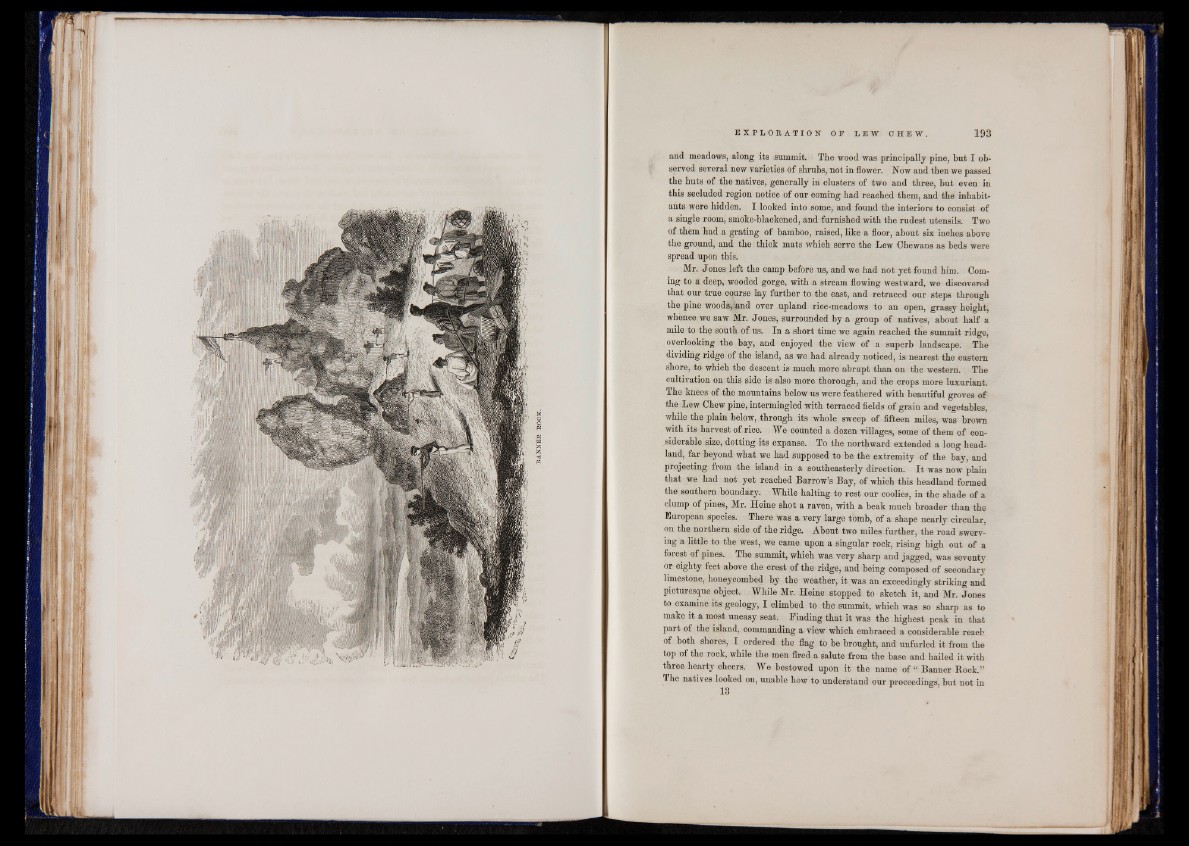
BANNER ROOK.
and meadows, along its summit. The wood was principally pine, but I observed
several new varieties of shrubs, not in flower. Now and then we passed
the huts of the natives, generally in clusters of two and three, but even in
this secluded region notice of our coming bad reached them, and the inhabitants
were hidden. I looked into some, and found the interiors to consist of
a single room, smoke-blackened, and furnished with the rudest utensils. Two
of them had a grating of bamboo, raised, like a floor, about six inches above
the ground, and the thick mats which serve the Lew Chewans as beds were
spread upon this.
Mr. Jones left the camp before us, and we had not yet found him. Coming
to a deep, wooded gorge, with a stream flowing westward, we discovered
that our true course lay further to the east, and retraced our steps through
the pine woods*,‘and over upland rice-meadows to an open, grassy height,
whence we saw Mr. Jones, surrounded by a group of natives, about half a
mile to the south of us. In a short time we again reached the summit ridge,
overlooking the bay, and enjoyed the view of a superb landscape. The
dividing ridge of the island, as we had already noticed, is nearest the eastern
shore, to which the descent is much more abrupt than on the western. The
cultivation on this side is also more thorough, and the crops more luxuriant.
The knees of the mountains below us were feathered with beautiful groves of
the Lew Chew pine, intermingled with terraced fields of grain and vegetables,
while the plain below, through its whole sweep of fifteen miles, was brown
with its harvest of rice. We counted a dozen villages, some of them of considerable
size, dotting its expanse. To the northward extended a long headland,
far beyond what we had supposed to be the extremity of the bay, and
projecting from the island in a southeasterly direction. I t was now plain
that we had not yet reached Barrow’s Bay, of which this headland formed
the southern boundary. While halting to rest our coolies, in the shade of a
clump of pines, Mr. Heine shot a raven, with a beak much broader than the
European species. There was a very large tomb, of a shape nearly circular,
on the northern side of the ridge. About two miles further, the road swerving
a little to the west, we came upon a singular rock, rising high out of a
forest of pines. The summit, which was very sharp and jagged, was seventy
or eighty feet above the crest of the ridge, and being composed of secondary
limestone, honeycombed by the weather, it was an exceedingly striking and
picturesque object. While Mr. Heine stopped to sketch it, and Mr. Jones
to examine its geology, I climbed to the summit, which was so sharp as to
make it a most uneasy seat. Binding that it was the highest peak in that
part of the island, commanding a view which embraced a considerable reach
of both shores, I ordered the flag to be brought, and unfurled it from the
top of the rock, while the men fired a salute from the base and hailed it with
three hearty oheers. We bestowed upon it the name of u Banner Bock.”
The natives looked on, unable how to understand our proceedings, but not in